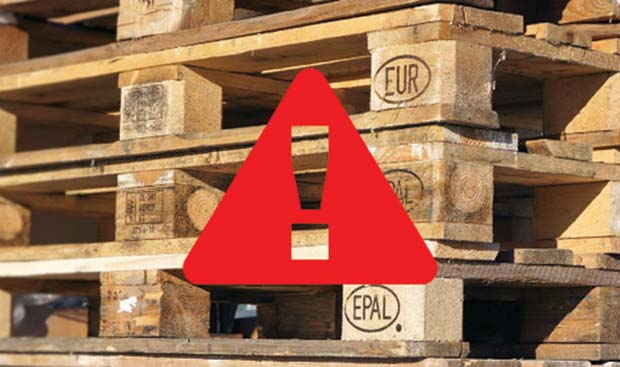On 1st March, the European Pallet Association, EPAL, announced the end of its exchangeability agreement with the UIC. As a result, after 1st May EPAL Euro pallets will no longer be exchanged for UIC/EUR pallets. So, if you’re using white wood pallets, what affect could the collapse of the EPAL/UIC exchange agreement have on your supply chain? Mike Bowie, Customer Service Director for CHEP UK & Ireland, evaluates the impact for white wood pallet users across Europe.
 EPAL is the standards body responsible for one of the largest ‘open pools’ of white wood Euro pallets in the world. Since October 2014, it has allowed its pallets to be exchanged with those accredited by the International Union of Railways (UIC), which oversees another Euro pallet pool of a similar size.
EPAL is the standards body responsible for one of the largest ‘open pools’ of white wood Euro pallets in the world. Since October 2014, it has allowed its pallets to be exchanged with those accredited by the International Union of Railways (UIC), which oversees another Euro pallet pool of a similar size.
But on 1st March, EPAL issued an urgent recommendation to “cease exchanging EPAL Euro pallets for UIC/EUR pallets.”
Research by EPAL points to East European gangs flooding the market with counterfeit pallets, with more than four million fakes entering the pool from Ukraine alone. EPAL says UIC has not done enough to address this problem, and as a result sees no option but to terminate the ‘exchangeability agreement’, with effect from 1st May earlier this year.
“This is a significant development in the white wood pallet market, and the potential impact is wide reaching for users of these pallets,” observes Mike Bowie, Customer Service Director for CHEP UK & Ireland. “These counterfeit pallets are clearly compromising quality which is not acceptable, and causes a significant risk to workplace safety.”
“CHEP pallets are not affected by this announcement, and the problem of counterfeit pallets is almost unheard of in the CHEP pool, because our pool is closed – i.e. our pallets cannot be exchanged with those of any other manufacturer,” explains Mike. “We track the position of all our assets continuously, so if someone did try to introduce a fake pallet into the pool, it would be identified as soon as it was returned to one of our service centres for inspection. And we would be able to work out where it came from very quickly, to prevent the problem from occurring again,” he continues.
 8 problems to beware of…
8 problems to beware of…
However, if you still use white wood Euro pallets for any of your deliveries, there are several problems likely to arise as a result of the collapse of the EPAL/UIC exchangeability agreement:
1. Using white wood Euro pallets for export will become much more complex
Companies exporting goods to the continent need to be aware that some retailers will now refuse to accept UIC/EUR pallets, or charge a penalty for doing so, meaning increased pallet rejections, and higher costs as a result.
2. More problematic imports from Austria, Scandinavia, Spain and Eastern Europe
These countries mainly use UIC/EUR pallets, so you may face additional costs related to administration and handling when importing.
3. The price of used EPAL pallets will rise
Buying a used pallet for under €2.50 will likely become a thing of the past, as UIC/EUR pallets will have to be removed and replaced by EPAL pallets.
4. Administrative costs in the white exchange pool will increase
EPAL pallets already require more administration because standards can vary within the pool; now extra administration will be required to manage UIC pallets separately and identify counterfeits.
5. ERP systems such as SAP will have to be updated
Systems will have to be modified in order to cope with the two types of pallets and their different cost profiles.
6. Injuries and product damage will increase
An increased risk of poor-quality pallets entering the white exchange pool means an increased risk of injuries and product damage. Higher compensation claims are to be expected.
7. Pallet repair businesses may refuse to accept UIC pallets
Pallet repair businesses may refuse to accept UIC pallets, or not pay for these, as it will no longer be possible to exchange them for EPAL pallets. This means costs are likely to increase, as these pallets will have to be purchased.
 8. Automated warehousing systems will have to be adapted to cope with variations
8. Automated warehousing systems will have to be adapted to cope with variations
Due to the variation in dimensions between EPAL and counterfeit UIC pallets, inspection points will have to be adapted or removed in automated warehouses.
What to do next
If you’re concerned about how the EPAL/UIC announcement may affect your supply chain, please request a call back from a CHEP expert. Or for further information regarding CHEP please contact Alan.Taylor@chep.com.
CHEP




Comments are closed.